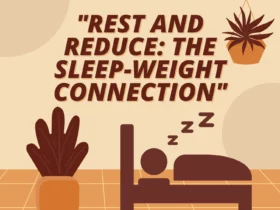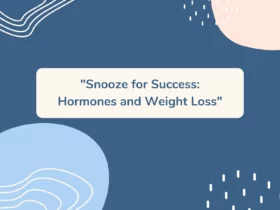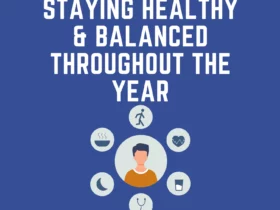The quest for successful weight loss often leads us to focus on diet and exercise, but one critical aspect that should never be overlooked is sleep. Behind the scenes, while we’re resting, a complex hormonal dance occurs that can significantly impact our weight management journey. Welcome to “Snooze for Success: Hormones and Weight Loss,” where we delve into the fascinating world of sleep hormones and their role in appetite regulation, metabolism, and overall weight loss success. In this comprehensive article, we’ll explore how sleep influences key hormones such as leptin, ghrelin, cortisol, and insulin, and how their delicate balance affects our food cravings, energy levels, and fat storage. Armed with this knowledge, you’ll be empowered to optimize your sleep habits and harness the power of hormones to propel you towards your weight loss goals. So, let’s dive into the world of sleep hormones and uncover how the quality of your slumber can become the secret weapon in your journey to a healthier, fitter, and more successful you.
Leptin: The Satiety Signal
Discover how the hormone leptin acts as the “satiety signal,” communicating to your brain that you’re full and should stop eating. Learn how sleep deprivation disrupts leptin levels, leading to increased hunger and overeating.
Ghrelin: The Hunger Hormone
Unravel the role of ghrelin, the “hunger hormone,” in stimulating appetite and promoting food intake. Explore how inadequate sleep can elevate ghrelin levels, triggering cravings for high-calorie foods.
Cortisol: The Stress Hormone
Explore the relationship between cortisol, the “stress hormone,” and sleep. Learn how sleep disturbances and chronic stress can lead to cortisol imbalances, contributing to weight gain.
Insulin: Balancing Blood Sugar and Weight
Understand the impact of sleep on insulin sensitivity, a hormone crucial for regulating blood sugar levels. Discover how sleep deprivation can lead to insulin resistance and weight management challenges.
The Sleep-Weight Connection: The Hormonal Symphony
Connect the dots between sleep hormones and weight management. Explore how the delicate interplay of leptin, ghrelin, cortisol, and insulin can determine the success of your weight loss efforts.
Sleep Duration and Weight Loss: Striking the Right Balance
Learn about the optimal sleep duration for weight management and overall well-being. Explore how both insufficient and excessive sleep can negatively affect hormonal balance and weight.
Sleep Quality: The Key to Hormonal Harmony
Dive into the significance of sleep quality in supporting hormonal balance. Discover strategies to improve sleep hygiene, create a restful sleep environment, and promote rejuvenating slumber.
Night Owls vs. Early Birds: Circadian Rhythms and Weight
Explore the connection between our internal body clocks (circadian rhythms) and weight regulation. Understand how aligning sleep with natural rhythms can influence hormonal balance and weight loss.
Sleep and Exercise: A Synergistic Approach
Learn how exercise can enhance the quality of your sleep and, in turn, support weight loss efforts. Discover the beneficial relationship between physical activity and hormonal regulation.

Mindful Sleep Practices: Relaxation for Hormonal Balance
Embrace mindfulness practices to reduce stress, promote relaxation, and support hormonal harmony. Explore meditation, deep breathing, and relaxation techniques for improved sleep quality.
The Impact of Sleep Disorders on Weight Management
Understand how sleep disorders, such as sleep apnea and insomnia, can affect hormonal balance and hinder weight loss progress. Seek professional help when addressing sleep-related issues.
Sleep for Long-Term Success: Maintaining Healthy Habits
Explore the importance of sustained sleep habits for long-term weight management success. Learn how to incorporate healthy sleep practices into your daily routine.
Creating Your Ideal Sleep Environment: The Path to Weight Loss
Craft a sleep-conducive environment tailored to your preferences. From temperature and lighting to reducing distractions, optimize your sleep space for rejuvenating rest.
Stress Reduction for Hormonal Balance and Weight Loss
Manage stress through lifestyle adjustments, relaxation techniques, and self-care practices. Lowering stress levels positively influences sleep quality and supports hormonal balance.
Your Sleep Journey: The Blueprint for Success
Create a personalized sleep plan based on your lifestyle, needs, and goals. Implement the insights from this article to harness the power of sleep hormones and propel yourself towards weight loss triumph.
Frequently Asked Questions (FAQs)
How does sleep affect weight loss and overall health?
Sleep plays a crucial role in weight management as it impacts hormonal balance, appetite regulation, and metabolism. Adequate and quality sleep supports overall health and well-being.
Which hormones are involved in the sleep-weight connection?
The key hormones involved in the sleep-weight connection are leptin, ghrelin, cortisol, and insulin. They influence appetite, hunger, stress response, and blood sugar levels.
How does lack of sleep affect appetite and food cravings?
Sleep deprivation disrupts hormones, leading to increased ghrelin (hunger hormone) levels and decreased leptin (satiety hormone) levels, resulting in heightened appetite and cravings.
Can poor sleep quality lead to weight gain?
Yes, poor sleep quality can contribute to weight gain by affecting hunger hormones, metabolism, and overall energy balance.
How can sleep duration impact weight loss efforts?
Both insufficient and excessive sleep can hinder weight loss. Striking the right balance and getting 7-9 hours of quality sleep per night is essential for optimal hormonal balance.
















Leave a Reply